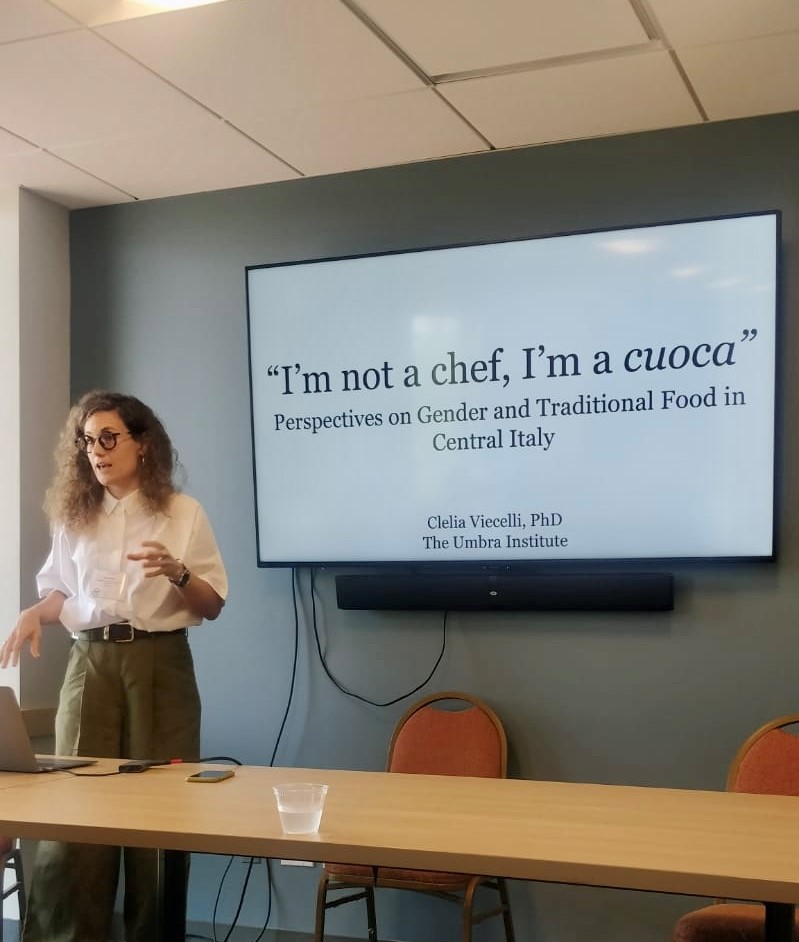Tradition and gender-based dynamics in the Italian cuisine: Dr Clelia Viecelli presents her research at the ASFS/AFHVS 2023 Conference

Clelia Viecelli, PhD, Professor of Anthropology of Food and History and Culture of Food in Italy at The Umbra Institute recently came back from the 2023 ASFS/AFHVS Conference in Boston.
For our European-based readers who might not be informed about this conference, the ASFS is the Association for the Study of Food and Society and the AFHVS is the Association for Agriculture, Food & Human Values Society. These two institutions are lead associations for academic research in the field of food and agricultural studies in the United States.
The Umbra Institute has always had an important link with the ASFS and AFHVS thanks to publications in their “Food, Culture & Society”, a peer-reviewed academic journal which is dedicated to food studies research from an interdisciplinary perspective. In 2021 in fact, it was a great honor for The Umbra Institute to see in this journal the publication by Dr Elisa Ascione, former Anthropology of Food professor at The Umbra Institute, together with Christopher Fink, Associate Professor of Health and Human Kinetics at OWU and Faculty Led Professor in our Summer Programs since 2009.
As part of the 2023 ASFS/AFHVS conference, Dr Viecelli presented her current ethnographic work on Italian female chefs. The title of her presentation was “‘I’m not a chef, I’m a cuoca’: Perspectives on Gender and Traditional Food from Central Italy”. The idea for this research was born in the place that she knows the best: her class. It was in fact in the Anthropology of Food course where an ethnographic project is conducted in local restaurants, that her students have started to raise questions related to gender in the Italian food sector. They have noticed that very few women are involved in managerial roles in the restaurants they visited. Most of these food venues are offering the so-called “traditional” Italian cuisine, which is historically associated with the domestic sphere where women have a central role in relation to food.
And from there, Dr Viecelli’s main research question for her own project: is traditional cuisine a way to empower female chefs, who usually don’t have a managerial role in Italian restaurants, or is the perpetration of this cuisine a way to remain stuck in these gender-based schemes?
Dr Viecelli conducted semi-structured interviews with 7 women that own or are the co-owners of restaurants in the area of Perugia, Umbria. Before presenting the main insights, a linguistic footnote must be added. Similarly to English, in Italian there are two different words to describe a person who cooks, “chef” and “cuoco/a”: on the one hand, chef, a french-originated word, has a very hierarchic and professionalizing connotation; on the other hand, the word cuoco/a designates the action, the person who actually cooks and prepares a meal.
The first insight that this research brings under the spotlight, is that the majority of the interviewed women identified themselves as “cuoche” and not “chefs”. By this they meant that they reject any hierarchical attribute associated with their job. Their main objective is not the performance, but to prepare a meal that brings joy and a sense of belonging to their guests. Tradition here is understood as something precious: “cuoche” perceive themselves as custodians of a specific knowledge which is nevertheless open to their personal interpretation.
On the opposite view, the only woman who presented herself as “chef” during the interview, justified the use of this term not so much in light of its hierarchical sense, but as a way of underlying a distinctive creativity. In other words, being a chef means being creative. In this regard, according to Dr Viecelli it is interesting to note that she aims to obtain the prestigious Michelin star for her restaurant, a recognition which has seen so far male chefs being the most awarded.
These two kinds of approaches uncover an overarching power dynamic affecting our being in society. We often hear about women having self-esteem issues and not recognising themselves as being powerful actors in our society. But, as Italian philosopher Luisa Muraro argues, maybe it could be the case that women have a different set of priorities from the all-male attachment to power and that power, as it is managed today, is not appealing to many women.
Dr Viecelli’s research is inextricably intertwined with the local community. Dr. Viecelli is in fact laying the ground for a true community engagement work in which she does not only involve the restaurants, but she is also trying to understand the aspirations, issues and expectations of the local female chefs. The most surprising and enlightening fact is that this research was inspired by another side of the community: the Umbra students. The circle is closed.